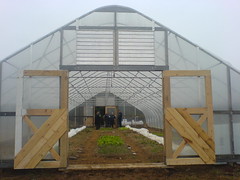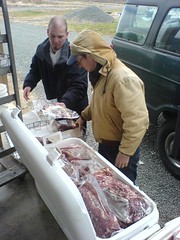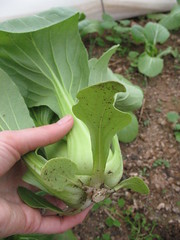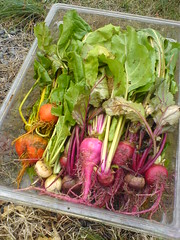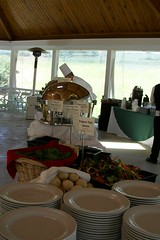Wednesday, December 31, 2008
A Tale of Two Farms: Essex’s Secret to Happiness
Mark and Kristin Kimball operate Essex Farm, featured in Bill McKibben’s Deep Economy as a unique example of a farm producing a complete food supply for local eaters. The 75 families who are members of the farm receive a wide spectrum of local food, enjoying both summer classics and nutritious winter staples. “Except for paper towels and dental floss, you’d never have to set foot in a store again,” writes McKibben.
The diverse range of products creates its own share of challenges for the farm. Kristin (a former travel writer) wrote in a 2005 article about the difficult task of managing multiple time sensitive projects at the same time. But the rewards are also great—for both customer and producer. “I felt like I had discovered something no less profound than the secret to happiness,” she said. Read more in her article for New Farm magazine.
Next time, we'll share some farm news directly from Mark and Kristin!
Monday, December 29, 2008
Open Hoophouse Celebration
Wednesday, December 17, 2008
Local Food Field Trip: Fauquier’s Finest Country Butcher Shop
Monday, December 15, 2008
16 Ft. Resource: Serve Your Country Food

More and more people are getting excited about the benefits of eating local food for better taste and nutrition. To meet the increasing demand for healthy food, we also need more people who are passionately committed to growing it. Serve Your Country Food spotlights farming as a viable career option for our country’s youth. Developed by The Greenhorns, this project aims to bring more attention to the surge in young people entering agriculture by including all young farmers on an interactive map and database. Check it out—and don’t forget to add your own farm to the map or nominate another emerging farmer to be included.
First Hoophouse Harvest
Thursday, December 11, 2008
Winter’s Many Shades of Green
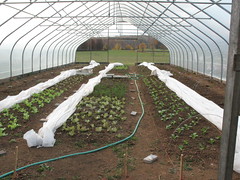
Lettuces, bok choy, kale, and other cool-weather favorites
Originally uploaded by Local Food Project at Airlie
Our new batch of seeds for the hoophouse recently arrived and we can already envision the tasty salads we’ll be harvesting for Airlie Center’s guests come February.
Arugula—Astro
Asian Greens—Yukina Savoy and Tatsoi
Cress—Presto
Pac Choi—Mei Qing
Allstar Lettuce Mix
Encore Lettuce Mix
Minutina (Erba Stella)
Wednesday, December 10, 2008
A Tale of Two Farms: Making Connections with Half Pint
Half Pint developed relationships with local chefs early on through the Intervale’s participation in the Vermont Fresh Network, an organization that fosters ties between farms and restaurants and provides the tools for buyers and sellers to establish long-term relationships.
Half Pint has seen its share of challenges—from floods, to rampant weeds, to a political battle over a new HayGrove hoophouse—but the Weltons continue to succeed (grossing over $50,000 on their mini-farm) through an awareness of the crops, processes, and customers that are right for their farm. Mara and Spencer also give back to the farming community by speaking at events, volunteering with domestic and international projects, and hosting gatherings at the farm.
Monday, December 8, 2008
December’s Colorful Harvest
Another heartening find was this perfect head of “Red Cross” lettuce, still prettily ruffled, crisp, and unharmed by frost, deer, or groundhog.
Wednesday, December 3, 2008
A Tale of Two Farms: A Full Grocery Bag from Essex
Kristin and Mark Kimball came to Essex Farm (in Northeastern New York near Lake Champlain) in the fall of 2003 and quickly set to work creating a unique CSA (Community Supported Agriculture) enterprise that provides members with a full grocery bag of food each week—vegetables, orchard fruits, grains, baked goods, dairy, and grass-fed meats. Powered by a team of Belgian draft horses, Essex Farm feeds 75 families year-round. Members experience the full spectrum of local food, enjoying not only summer classics like tomatoes and peppers, but nutritious (and storable) winter squashes and root vegetables.
Next time, we'll look at how Half Pint established lasting relationships with area restaurants.
Tuesday, December 2, 2008
A Tale of Two Farms: How Half Pint Got Started
Mara and Spencer Welton grow baby greens and gourmet specialty crops for direct sale to farmer’s markets and restaurants and wholesale to local grocery stores in Burlington, Vermont. Looking ahead to its seventh season, Half Pint Farm began as an incubator project at the Intervale, a reclaimed urban waste site that now hosts a network of thriving small farms.
The Weltons have purposefully kept Half Pint small, finding the one and a third acres a perfect size for two people to manage and capable of producing exquisite vegetables that stand out for their taste, nutrition, and uniqueness. Check out Half Pint Farm’s website to learn more.
Next time, we'll share a peak at how Essex Farm offers CSA members a full grocery bag of good food!
Monday, December 1, 2008
From Garden Bed to Dining Room Buffet
You’ll see plants getting their start as tiny seedlings, growing, being harvested, washed, delivered, prepared, and presented for the enjoyment of Airlie guests. Start the tour now!
Monday, November 24, 2008
A Tale of Two Farms: Half Pint and Essex
To register for "A Tale of Two Farms," send an email to localfoodproject@airlie.org.
Wednesday, November 19, 2008
View from a ladder: Four-square compost bin
The Local Food Project at Airlie demonstrates the ins and outs of a small-scale food system. An important cog in that system is the compost we develop with garden waste and food scraps from the Airlie Center kitchen. We received almost 20,000 pounds of scraps last year—a valuable supply of nitrogen that, when combined with carbon-rich plant stalks and other brown matter from the garden, cooks down into moist, black, crumbly compost dense with nutrients that vegetables need to thrive. For more information on soil and compost, visit ATTRA, the National Sustainable Agricuture Information Service’s Sustainable Soil Management section.
We designed this four-square compost bin to effectively handle daily additions of food scraps from Airlie’s kitchen, provide a convenient place to store brown matter, and allow for a smooth transition between active and completed piles. From our view up on the ladder, this style of compost bin will do a lot to enhance our system, helping it become more sustainable and complete.
Monday, November 17, 2008
The simple joy of cleaning tools
Monday, November 10, 2008
Exploring the Small Farm Dream
On November 6, the Local Food Project at Airlie hosted its first session of a unique decision-making course for potential farmers. “Exploring the Small Farm Dream: Is Starting an Agricultural Business Right for You?” was developed by the New England Small Farm Institute to bridge the gap between ideas and action.
We welcomed a diverse group of 26 small farm dreamers and launched right into a series of exercises assessing skills, knowledge, financial considerations, resources, and risks. Course participants were excited to share their ideas for farm businesses. Most have plans to market a varied product line including items like vegetables, berries, orchard fruits, grass-fed meats, dairy, and even mushrooms and nuts. The coming sessions will feature several local farmers who will provide a peek into their own farm business journeys. We hope to spend the next four weeks helping members of the class explore their dreams and come one step closer to launching their farms!
Monday, November 3, 2008
View from a sixteen foot ladder
This summer, my co-intern Lauren and I read two books with some contradictory messages about the best way to run a sustainable garden—How to Grow More Vegetables, by John Jeavons, and Gardening When It Counts, by Steve Solomon.
We created a skit about two warring disciples of these master gardeners and performed it at our July “Small Space, High Yield” workshop. “The Voice of Compromise” (played by Pablo) saved the day by descending from a sixteen foot ladder and explaining that we shouldn’t let sticking to one certain method get in the way of growing food and building community.
Since then, we’ve realized that climbing up on that sixteen foot ladder allows us to get a refreshing perspective on all of the tasks and chores and projects we’re working on. From sixteen feet up we get a sense of the whole system working as one. And it’s exhilarating to stand high above the ground, a little shaky as the breeze sweeps in from the fields, feeling both proud and ridiculous on such a bold set piece in a little garden full of food.
Winter salad bar
Here’s what we’re growing:
Green Lettuce—Jericho
Red lettuce—Red Cross, Yugoslavian, and Sweet Valentine
Kale—Laci Nato, Vates
Bok Choy—Mei Ping
Swiss Chard—Rainbow
Basil—Lettuce Leaf, Lemon, Red Rubin, Italian Large Leaf
Dill
Fennel
Once we get the hoophouse completely sealed up, I’m thinking it’s going to be our favorite place to escape the winter cold. And I can’t wait for next spring when it will help launch our spring and summer garden.
Cover crops for new growing space
To begin preparing the soil for next spring, we made one pass with the tiller about four weeks ago. Last week, we tilled again, then direct sowed field peas and oats by scooping them out in handfuls and letting them scatter over the freshly turned soil. These cover crops, also known as "green manures," do great things for the soil. According to Eliot Coleman's The New Organic Grower, "Green manure crops help protect against erosion, retain nutrients that might otherwise be leached from the soil, suppress the germination and growth of weeds, cycle nutrients from the lower to the upper layers of the soil, and--in the case of legumes--leave to the following crop a considerable quantity of nitrogen."
The little seeds that ran through our fingers will bring enormous benefits to our garden! To keep them protected, we fought high winds and covered each section with a light layer of straw. When we’re ready to put seedlings in the ground next season, we’ll plant directly through the cover crops, then watch as the plants thrive in the enriched soil.

